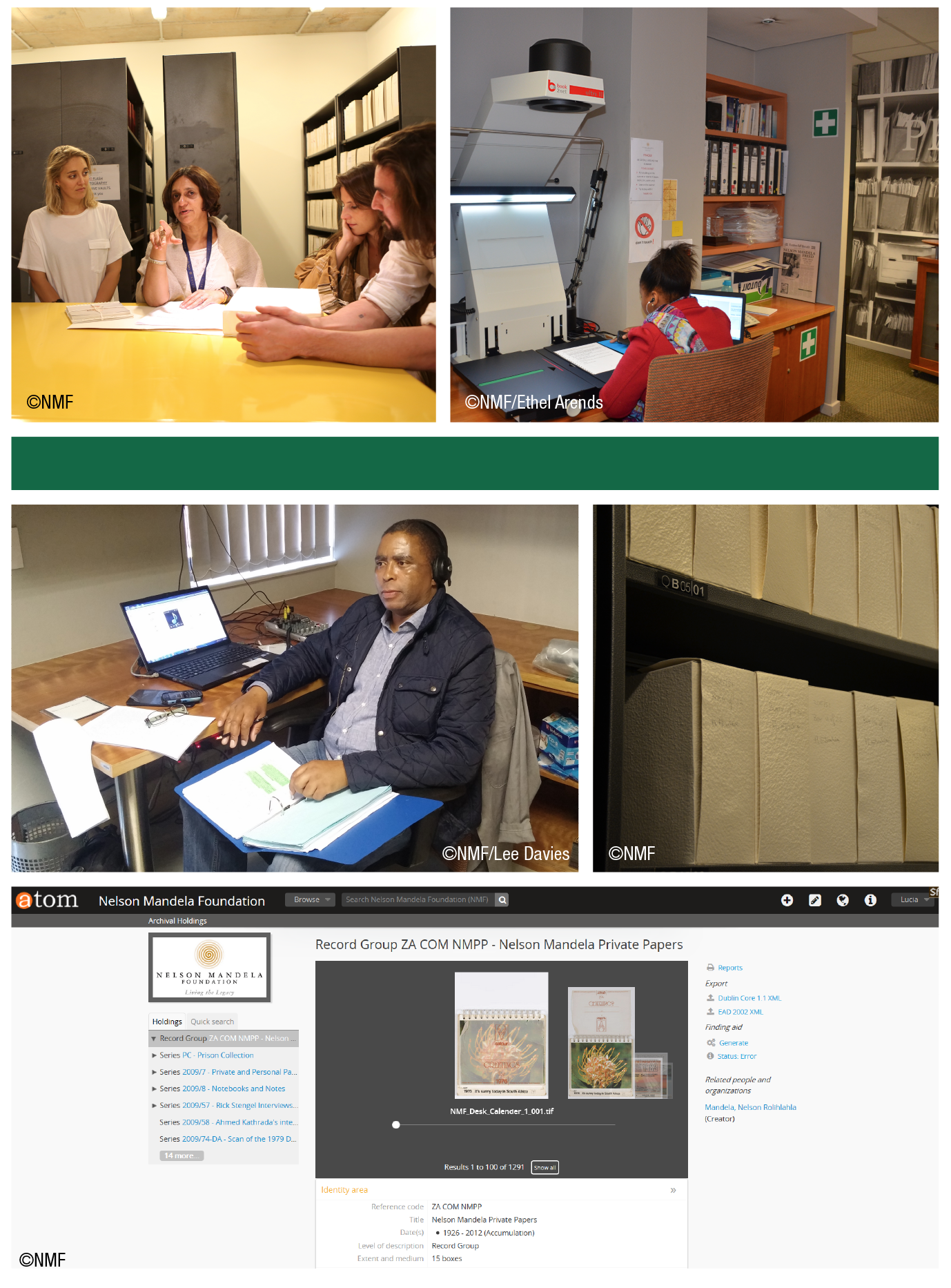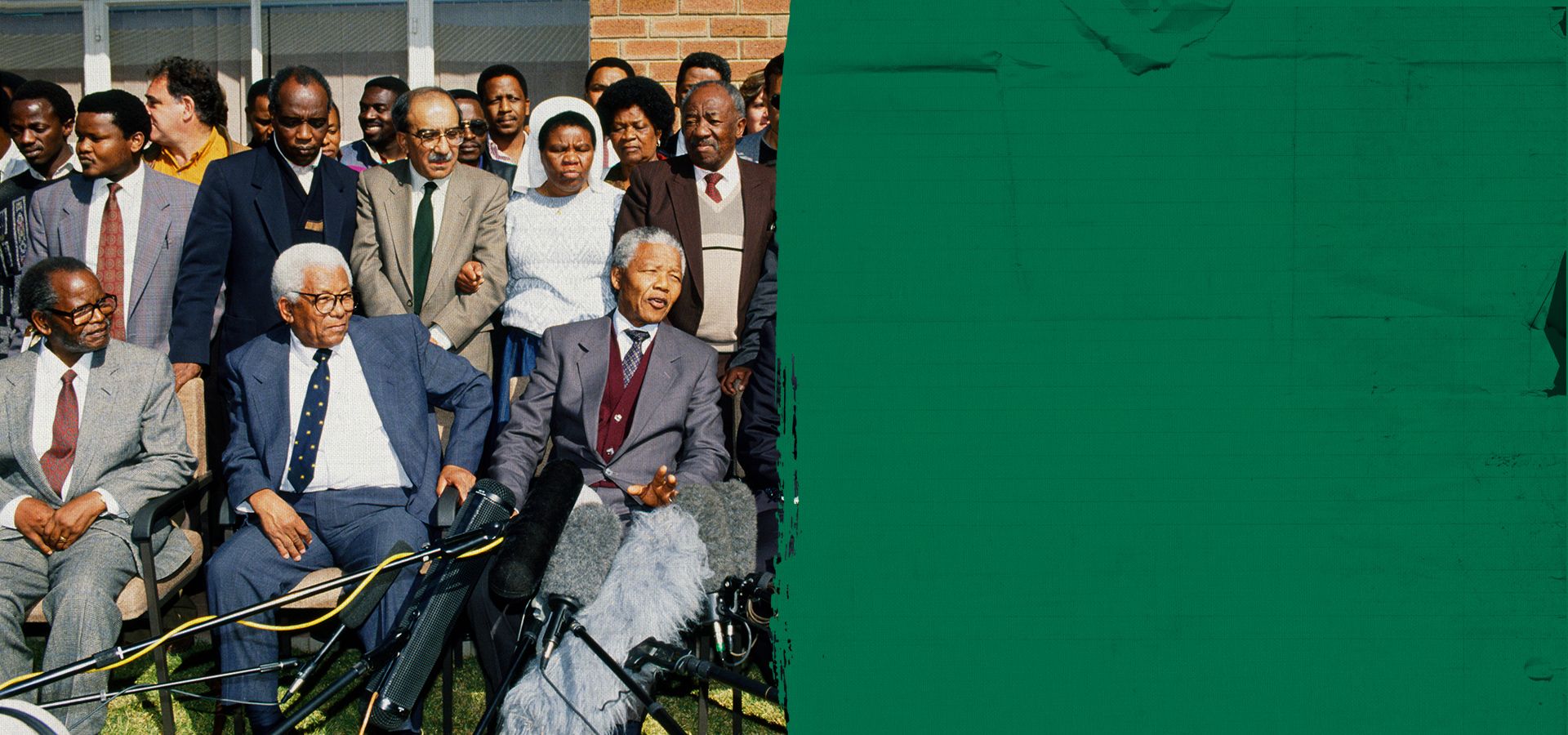Unlike most conventional archives, the Foundation’s Centre of Memory does not focus purely on the custody of physical collections (although it has substantial and growing collections). The Nelson Mandela Digital Archive is infinite, fragmented and scattered, both geographically and institutionally. It is neither the intention of the NMF, nor its mandate, to bring all the materials into a single physical collection, but to document this vast resource, facilitate access to it, and promote its preservation and use.
Web-based technology is the most important tool in achieving this objective. The Foundation has conceptualised a multilayered virtual archive (portal), accessible through the website (www.nelsonmandela.org).
The portal is defined by these key design elements:
- A surface layer of stories and information
- Databases providing dense description of materials
- Links to actual materials, other sites and different layers within the site
- Digitised materials, from hard copy to moving images
- Social media integration
Throughout the reporting period under review, the Foundation has focused on the continuing digitisation project, and the integrated digital archival platform is key to preserving the archive and providing access to it.
Highlights over the past year include:
- Ongoing absorbing and cataloguing by our data capturers
- Procuring mass storage to enhance and assist the digitisation project. The storage has been upgraded from 48Tb onsite and 48Tb offsite to 148Tb onsite and 148Tb offsite
- The completion of the digitisation of the 46664 archive
- The Foundation is in the final stages of digitising the O’Malley oral history archive in collaboration with the Mayibuye Centre
- Serving on a reference group with the History Workshop at the University of the Witwatersrand and the French Institute of South Africa to support the creation of a comprehensive catalogue of the digitised Rivonia Trial dictabelt audio records
- Maintaining the Foundation’s virtual exhibits on the Google Cultural Institute platform, monitoring functionalities, and developing and making available a virtual tour of the Foundation and archive
- The archival collections accessioned in the last report year have all been processed and catalogued. These include:
- Mac Maharaj’s donation of Robben Island-related materials
- Judge Richard Goldstone’s materials from the Goldstone Commission
- Hassen Ebrahim’s donation of his Codesa and Constitutional Assembly-related records
- Providing advice to the ANC on record-keeping policy
- Regularly updating all databases and other web-accessible resources
- Providing continued assistance for the Naidoo-Pillay family history project, especially towards the Resistance in their blood exhibition at the Apartheid Museum (launched in June 2017)
Access to the archive is facilitated via the digital platform, by responding to emails and telephone requests and researchers using the Foundation’s reading room.

Research
The Foundation continued to receive enquiries about Mr Mandela from around the world. These included queries about archival sources, access to materials, accuracy checks and use of Mr Mandela’s intellectual property. The Foundation constitutes a one-stop-shop for all such enquiries, whatever their origin.
The Foundation also has our own publications programme:
- Between 1998 and 2002, our Founder worked on what was intended to be a sequel to his autobiography, Long Walk to Freedom. Provisionally titled The Presidential Years, the manuscript was left unfinished. In the report period, our senior researcher continued to assist the team completing the work in collaboration with the publishers, Blackwell & Ruth (formerly PQ Blackwell). The book will be launched in October 2017
- Research and writing is well advanced on a collection of Mr Mandela’s prison correspondence
- Work is advancing on a collection of reminiscences and memories by Mr Mandela’s staff from the time of his release from prison, throughout his presidency and during his retirement. The aim is to have them published in book form in 2018
The Foundation’s dedicated research resource provided assistance for a number of new documentaries and tributes by a range of film and television producers.
Colin Bundy (Oxford University, UK), Xolela Mangcu (the University of Cape Town) and Stephan Bierling (University of Regensburg, Germany) used the archive for books they had been commissioned to write on Mr Mandela.
The Archive and Dialogue division provided continuing research and analysis to support all the Foundation’s functions and projects.
These included the generation of position papers on land reform and the role of civil society. Ten opinion pieces, either commissioned or written by staff, were published. We also published five reflections on the 2016 Nelson Mandela International Dialogues on our website.
Other research projects included:
- Research assistance to Mr Concord Nkabinde for his musical production on Nelson Mandela entitled The Song Lives On
- Support to Mr Sello Motloung, who was preparing for his role as Nelson Mandela in the upcoming feature film An Act of Defiance
- Support for a new book by the late Ahmed Kathrada continued in the report period. The book was scheduled for publication in early 2017
- Assistance to Dr Jacques Moreillon, formerly of the International Committee of the Red Cross, for the online publication of his memoirs focusing on his visits to Mr Mandela and other political prisoners on Robben Island
- Assisting our senior researcher to travel to Nairobi, Kenya, to address the Young African Leaders Initiative on Mr Mandela’s leadership
Records management
For any organisation, sound records management policies and practices are of inestimable value, and especially so in the case of the Foundation, whose records and related information have the potential to become resources in the Centre of Memory. In the report period:
- The Foundation continued to oversee routine correspondence
- Close monitoring of the organisational file plan implemented in 2011 continued. The electronic version (EDocs) is given ongoing support in terms of training and monitoring
- New main series were designed and implemented for three programmes
- Support was provided for both paper-based and electronic backfiling
 © Louise Gubb
© Louise Gubb